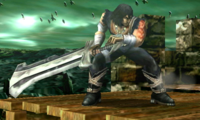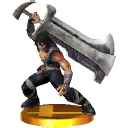Magnus
| Magnus | |
|---|---|
| File:Magnus Uprising.png File:KidIcarusSymbol.png Official artwork of Magnus from Kid Icarus: Uprising. | |
| Universe | Kid Icarus |
| Debut | Kid Icarus: Uprising (2012) |
| Smash Bros. appearances | SSB4 |
| Most recent appearance | Kid Icarus: Uprising (2012) |
| Console of origin | Nintendo 3DS |
| Species | Human |
| Article on Icaruspedia | Magnus |
Magnus(マグナ Maguna) is a character from Kid Icarus: Uprising. He is a man of Herculean strength, and he is considered the mightiest human swordsman in the world, as well as being a skilled mercenary.
Origin
In Kid Icarus: Uprising, Magnus is a recurring character, being one of three notable human characters. In Chapter 2, whilst storming one of the Underworld Army's bases, Magnus appears as the only human who has successfully entered the castle. After brief conversation, he and Pit team up for the remainder of the chapter. He does not appear again until Chapter 18, three years later, when Pit is forced to possess his body through the use of a ring. Here, he demonstrates express hatred towards the gods, as well as proving his immense strength, and versatility, having similar health to Pit.
In Super Smash Bros. 4

Magnus appears as an Assist Trophy in Super Smash Bros. 4. When summoned, Magnus can attack the summoner's foes. Unlike most assist trophies, he is not completely immune to attacks or thrown items, and he can occasionally dodge, similar to actual fighters.
Trophy
- Magnus
- Magnus is perhaps the mightiest human warrior, and he has weathered countless battles. He seems to prefer working alone, and he can respect the strength of foes like Dark Lord Gaol. However, he seems reluctant—not afraid—to fight Gaol. Is there a connection between these two?
|
| |
|---|---|
| Fighters | Pit (SSBB · SSB4 · SSBU) · Palutena (SSB4 · SSBU) · Dark Pit (SSB4 · SSBU) |
| Assist Trophies | Magnus · Phosphora |
| Stages | Skyworld · Reset Bomb Forest · Palutena's Temple |
| Items | Back Shield · Daybreak · Killer Eye · Ore Club · X Bomb · Staff |
| Enemies | Boom Stomper · Bumpety Bomb · Clubberskull · Daphne · Flage · Lethinium · Lurchthorn · Mahva · Megonta · Mimicutie · Monoeye · Nutski · Orne · Reaper & Reapette · Skuttler · Souflee · Zuree |
| Other | Centurion · Viridi |
| Trophies, Stickers and Spirits | Trophies (SSBB · SSB4) · Stickers · Spirits |
| Music | Brawl · SSB4 · Ultimate |
| Masterpiece | Kid Icarus |

